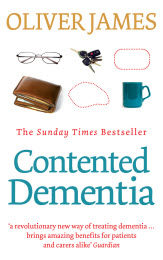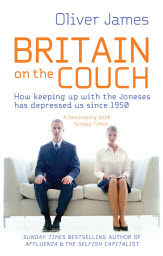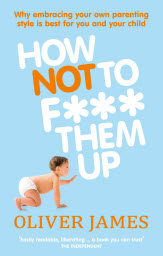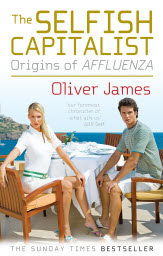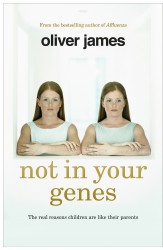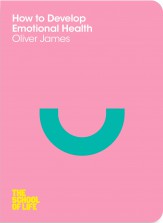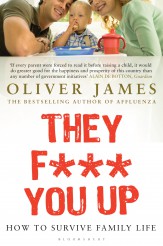Welcome to the Oliver James website
Oliver James Curriculum Vitae
Oliver James (born 1953) is a British attachment-based psychoanalytic psychotherapist, chartered psychologist, book author, television producer-presenter, broadcaster and journalist. He has published 13 books, 3 of which sold over 150,000 copies. Between 1982-2006, James made 10 television series and 7 individual documentaries. Between 1990 and 2016 he wrote columns in 6 different national newspapers and did hundreds of features for them, and for magazines.
In 2008, in the midst of the Credit Crunch on BBC Newsnight he demanded that Teresa May (then a shadow minister) apologize for the Thatcherite policies which he believed caused the Crunch https://www.youtube.com/watch?v=3QM1aFNZWvU.
The core issues that his books (and television programmes) have dealt with have been summarized as:
‘Theme one: capitalism is bad for you – whether you are a beneficiary or a victim of its inequalities. (Hence his 2007 book Affluenza, its follow-up The Selfish Capitalist and his description of the 2008 financial crisis as a case of “corporate psychopathy”.)
Theme two: families matter. He has titled not just one but two books after Larkin’s “This Be The Verse”: They F*** You Up: How to Survive Family Life (2002) and How Not To F*** Them Up (2010). It’s the main take-home of Upping Your Ziggy.’ https://www.independent.co.uk/arts-entertainment/a-tad-insane-a7061151.html
TELEVISION
Between 1982 and 2006, James was the producer, presenter or assistant producer of 9 documentary series and 7 individual programmes.
He was the Series Consultant and Associate Producer of Under Fives (1982, Granada television, ITV), about parenting. Following a research trip to New York where he obtained audiotapes of the murderer explaining his motives, he was Assistant Producer of The Man Who Shot John Lennon (1988, First Tuesday, Yorkshire Television, ITV). He was the producer-presenter of Room 113 (1987/8, C4, 22 episodes in each series, part of the BAFTA award winning Network 7,). This interview series was described by Chris Dunkley in the Financial Times as the best interviews since Face To Face. It received extensive newspaper coverage, including the programme in which Stephen Fry first announced that he was gay. Also in 1988, James was the Assistant Producer and interviewer in a 6-part series on the causes of violence, Men On Violence (LWT, ITV).
In 1990, James produced The Last Day, an episode of the Channel 4 documentary short TV series Short Stories.[26][27] It documented The Mail on Sunday on their final day working at Fleet Street. In 1993, James produced three programmes as part of the BBC2 Crime and Punishment season. Wot U Lookin At was a science programme in the Horizon series. It examined the causes of violence, and why it was on the increase. Two BBC2 40 Minutes were also produced by him as part of the season, one about a psychopathic prisoner undergoing therapy (Prisoner HC2870), the other in which a rapist meets a survivor of rape (Rape). In 1995, James produced and presented Prozac Diary for The Late Show, part of the States of Mind season. It followed the creative artists Michael Bracewell, Alice Thomas Ellis, Alan Jenkins, and Bernard Sumner, over 4 weeks to see how the antidepressant Prozac might affect their creativity.[31][32][33] In 1997, James produced and presented the 7 episode talk show The Chair for BBC Two. with Vanessa Feltz as the first guest, then Paul McKenna, Peter Mandelson, Patsy Palmer, Julian Clary, David Icke, and George Graham. A picture of Mandelson shedding a tear during the interview appeared on 3 out 4 of the covers of the broadsheet newspapers on the day the programme was transmitted. In 1998, James presented a 2-part series, New Britain on the Couch (C4) explaining the rise in depression since 1950. In 1999, James presented Affairs of the Heart (C4), about infidelity, including an interview with Jonothan Ross.[25] James’ final television series were called Through The Eyes of the Child (2003-2006, ITV), a segment in the This Morning series. In each episode he would visit a problem child and offer advice on solving it, returning two weeks later to see if it had worked. It was where his Love Bombing technique originated (see books, below).
JOURNALISM
Between 1990 and 2016, James wrote columns in 6 national newspapers: the Observer magazine, Health and Wellbeing https://www.theguardian.com/lifeandstyle/2005/oct/23/healthandwellbeing; the Guardian Family Section, called Family Under the Microscope https://www.theguardian.com/profile/oliverjames; the Financial Times https://www.ft.com/content/81a2a036-f9b9-11e6-bd4e-68d53499ed71 ;The Independent https://www.independent.co.uk/voices/commentators/oliver-james-despite-ourselves-we-are-all-gordon-gekkos-now-774535.html ; the Telegraph https://www.telegraph.co.uk/sponsored/lifestyle/legal-services/10118858/oliver-james-divorce.html; and the Sunday express (citation needed)
James contributed hundreds of articles and comments for articles to national newspapers.
SCIENTIFIC PAPERS
James coauthored a scientific paper with Kate Pickett and Richard Wilkinson, the authors of The Spirit Level, about the impact of inequality on mental health in 2006 https://pmc.ncbi.nlm.nih.gov/articles/PMC2652881/. These findings were an important foundation for their subsequent book, The Inner Level. James’ paper on genes was published in 2014 https://thebowlbycentre.org.uk/wp-content/uploads/2014/10/Not-in-Your-Genes%E2%80%94Time-to-Accept-the-Null-Hypothesis-of-the-Human-Genome-Project.pdf He wrote two papers for The Psychologist magazine, one about the impact of parents on children (2003) https://www.bps.org.uk/psychologist/they-muck-you, the other about the adverse impact of neoliberalism on mental health (2007) https://www.bps.org.uk/psychologist/selfish-capitalism-and-mental-illness In 2018 he published a review of the evidence that childhood maltreatment is the major cause of adult mental illness https://www.internationalcat.org/_files/ugd/ff32b4_da6abf5d500e4164852b303712cd9f86.pdf#page=9
RECEPTION OF WORK
James’ books and television programmes have attracted hundreds of favourable reviews, commentaries and positive attention. For example, the ITV documentary The Man Who Shot John Lennon, which he originated, was shown on PBS in America. His interviews in Room 113 were the most valued feature by viewers in the BAFTA-award winning series of which it was a part, Network 7, on Channel 4. His interview with Peter Mandelson for BBC2’s The Chair led to front page photographs of Mandelson shedding a tear during the interview on 3 of the 4 national broadsheets. {{NB for citations for these programmes, use the ones in Television}}
Three of his books each sold over 150,000 copies (They F*** You Up, Affluenza, Contented Dementia). Numerous reviews have been published of all these books, most of them positive https://www.google.co.uk/search?sca_esv=f5734af37fe2ac71&q=Affluenza+reviews&sa=X&ved=2ahUKEwjyvK6A4JeJAxWuXUEAHZbBNpoQ1QJ6BAgrEAE&biw=1198&bih=848&dpr=2 https://www.theguardian.com/books/2007/jan/27/booksonhealth.society, some negative eg https://www.theguardian.com/commentisfree/2008/jan/04/enlightenedselfishinterest. His book Britain on the Couch was described as ‘pioneering’ https://www.theguardian.com/commentisfree/2009/jul/26/women-wellbeing-unhappiness, a reviewer recommended that Contented Dementia be available on the health service https://www.independent.co.uk/arts-entertainment/books/reviews/contented-dementia-by-oliver-james-1807360.html and his Love Bombing method for dealing with difficult childrenhas attracted considerable interest https://en.wikipedia.org/wiki/Love_bombing
His book for mothers, How Not To F*** Them Up, attracted a hostile commentary from Deborah Orr in the Guardian, describing his views on the nature versus nurture debate as hypocritical, “If he was confronted with a mother doing exactly that to her child, I’m sure James would consider it abusive”.[16] This provoked two distinguished clinical psychologists to write letters to the Guardian defending James https://www.theguardian.com/society/2016/mar/14/mental-illness-and-familial-influences
His most recent book, Not In Your Genes, was founded on a scientific paper he published https://thebowlbycentre.org.uk/wp-content/uploads/2014/10/Not-in-Your-Genes%E2%80%94Time-to-Accept-the-Null-Hypothesis-of-the-Human-Genome-Project.pdf which was based on the established fact that the Human Genome Project has been unable to identify genes which explain much of our psychology, known as the ‘missing heritability’ https://www.cs.sjsu.edu/~khuri/Aalto_2010/Manolio_2009.pdf . The book attracted some positive reviews https://www.independent.co.uk/arts-entertainment/books/reviews/not-in-your-genes-the-real-reasons-children-are-like-their-parents-by-oliver-james-book-review-a6919391.html, summarizing his argument as ‘parents, unconsciously, impose aspects of their own upbringing on their offspring: “It is not genes that pass traits between generations. It is patterns of nurture”. The proof, James claims controversially, lies in the fact that the Human Genome Project has uncovered no “psychological” genes.’. James set out his argument on a BBC Radio 4 Start The Week programme, with a geneticist, Marcus Munafo, putting the alternative case https://www.bbc.co.uk/programmes/b071skp5 .
A single critic, psychologist Stuart J Ritchie, wrote several pieces challenging James. He described the book as a “straw man made flesh”, “a compendium of psychological myths and legends”, and “bending over backwards to avoid awkward conclusions”. Ritchie wrote, “Few books risk such damage to the public understanding of science as those by Oliver James”, and accused James of “scientific illiteracy”.[17]
Ritchie described the book’s thesis as “children are born with brains of soft clay, their mental makeup unaffected by genes and infinitely mouldable by their parents”, and that “DNA has no effect on the mind or mental health, whereas parenting reigns supreme”. Ritchie described a variety of evidence which contradicts this view.[17]
Ritchie also responded to a letter from James in The Psychologist.[18] following which James and Prof Richard Bentall of the University of Liverpool engaged him in argument.[19] James responded to Ritchie’s criticisms in an article in The Guardian in March 2016, where he argued, “… mental illness is often caused by maltreatment and social disadvantage. In one study, a person who had suffered five or more kinds of maltreatment was 193 times more likely to become schizophrenic compared with someone who suffered no maltreatment. It’s the same for other mental illnesses. In the best study following children from an early age, nine out of 10 who were maltreated had developed a mental illness by the age of 18.”[20]
In all his criticism, nowhere did Ritchie present evidence contradicting James’ fundamental contention: that the Human Genome Project has only found negligible heritability of psychological traits, like intelligence or mental illness.
Books by Oliver James
